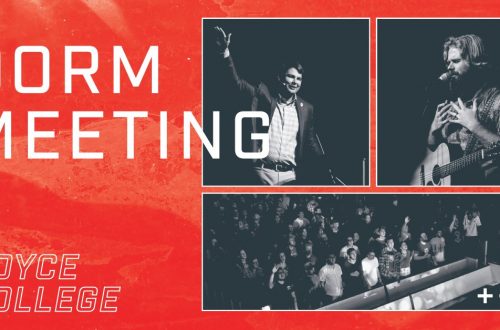Last week, I had the opportunity to listen to Russell Moore’s provocative interview with Rick Warren, the former pastor of Saddleback Community Church. If you are a Southern Baptist and you haven’t heard it yet, I recommend that you take a listen or read the transcript here.
Warren makes it crystal clear that he knows Saddleback is in defiance of the BF&M by ordaining women as pastors. He also says that Saddleback doesn’t need the SBC but that the SBC needs Saddleback. So it would be no skin off his nose to leave the SBC behind. Nevertheless, he’s going to fight Saddleback’s removal in order to make the SBC a safe haven for churches with women as pastors. In his own words:
In my heart of hearts, I just want to walk away from it. You don’t want to be where you’re not wanted, right? OK. I knew last year at the Convention, but I don’t… I don’t think I can do that. I think that’s a selfish thing to do. I think I need to stand up for the pastors who are scared to death by this inquisition, and I think I need to stand up for the millions of godly Southern Baptist women whose gifts and leadership skills are being stymied. So I’m gonna most likely appeal it. Not for my benefit, we don’t need it. We don’t need the Southern Baptist Convention. They need the 6,000 purpose driven churches that are in the Southern Baptist Convention in our fellowship. But we don’t need the Convention. But it would be for the benefit of others. Not for us.
Why would he bring this division to the convention knowing what the BF&M says about pastors? Because he doesn’t believe that the BF&M should be the basis for cooperation in the SBC. He says,
Southern Baptists have always been anti-creedal… Go read the preamble of The Baptist Faith Message, which it says this is not binding on anybody. It says it in the preamble. This is not binding on any church, but now we’re turning it a confession into a creed and we’re weaponizing it. We’re starting an inquisition.
It was surprising to hear Warren so openly and brazenly dismiss not just the part of the BF&M that concerns pastors, but the entire BF&M as any kind of confessional standard for Southern Baptist cooperation. Nevermind that the SBC Constitution says that cooperating SBC churches must have “a faith and practice which closely identifies with the Convention’s adopted statement of faith.” Rick Warren says the BF&M should be set aside as a standard, and he intends to make that case at the annual convention this June in New Orleans.
Moore asks Warren if he would support women serving as pastors, elders, or any other leadership role. And Warren says without missing a beat, “I would.” Because the SBC holds beliefs that limit the pastoral office to men, Warren says,
I believe millions of Southern Baptist women are being… Their talent and their spiritual gifts are being wasted. And if the Southern Baptists don’t want them, I’ll take them. I’ll take them, and I’ll and I’ll, I’ll help them find a place to serve and glorify God with the spiritual gifts they were given.
Perhaps you are as surprised as I am that Warren would come right out and say that he openly opposes the SBC’s statement of faith as a basis for cooperation. Not only that, he’s basically declaring that his new egalitarian beliefs (which he says are only three years old) must now set a new standard for cooperation in the SBC.
I didn’t like what I was hearing in this interview. But now that I have had some time to reflect on Warren’s remarks, I think he may have just rendered a great service to the SBC. Warren has just given us a preview of the kinds of arguments that he and his supporters are going to make on the floor of the SBC in June. If you listen to the interview, you will find that the arguments consist of mishandling the Bible while trying to manipulate the emotions of listeners. Anyone who plans to be a messenger to the SBC this June needs to listen to Warren’s arguments now so that they will be ready to resist them when the manipulation begins in earnest on the floor of the convention.
So I thought it might be useful to summarize some of the bad arguments that appear in this interview and that will likely show up on the floor of the convention in June:
Bad Argument 1: Shouldn’t the SBC care more about abused women than they do about women as pastors?
At the beginning of the interview, Moore says that he was “bowled over” that the SBC would remove churches that have women as pastors when the SBC continues to have so many problems with women being abused. Warren responds:
Let me tell you word about that. It’s not an accident that the same voices that said we cannot protect women from abuse because of the autonomy of the local church are the same voices that are saying, “But we can prevent them from being called pastors”… The autonomy only matters if it’s convenient for you.
This is a manipulative argument that presents a false dichotomy—as if the SBC has to choose between giving attention to abuse reform or to women as pastors. The SBC cares deeply about abused women and has undertaken massive reforms to make sure that cooperating churches take this seriously as well. The SBC is capable of doing both things at once, and anyone who says that we can’t is not telling the truth. We can walk and chew gum at the same time. We have already been doing that, and will continue to do so. Abuse reform is not going to lack any effort or attention as a result of Saddleback’s removal. No one should weaponize abuse reforms against our own doctrinal basis.
Bad Argument 2: It’s racist not to cooperate with churches that have women pastors.
Warren makes this extraordinary argument in his interview, and I wouldn’t be surprised if someone were to try it on the floor of the SBC. Warren says,
Here’s the thing. For hundreds of years, Black Baptist churches have been ordaining women as bishops, as pastors, as prophetesses, as apostles, as elders, as deaconesses. If this is true, the SBC is holding up a sign said, “All black churches look elsewhere. You’re not wanted here.” Because they already have.
This argument implies that anyone who supports the BF&M’s teaching is tantamount to being a racist because he isn’t welcoming to black churches. This is a massive distortion of the issue. The BF&M doesn’t exclude any church on the basis of race or ethnicity. Our cooperation is based on biblical mission and biblical doctrine, both of which welcome people of every race, ethnicity, sex, or social station. Our unity is in what we confess, not in the color of our skin. That is why there are pastors, leaders, and church members from diverse races and ethnicities across the SBC.
The truth is that the BF&M’s teaching is based on what the Bible says in texts like 1 Timothy 2:12, 3:2 and Titus 1:6. These texts are not racist. They are simply setting forth standards for church leadership. If those standards are deemed as racist, then that implies that God’s word itself is racist. The truth is that these texts apply to all churches without respect to race or ethnicity. Anyone who suggests otherwise is misleading you.
Bad Argument 3: The Bible supports women serving as pastors.
Warren says that three years ago he changed his views on women as pastors. He says,
I understand why people get upset about this, because I believe the way they did until three years ago, and I actually had to change because of Scripture. Culture could not change me on this issue. Anecdotes could not change me on this issue. Pressure from other people would not change beyond this issue.
What changed me was when I came to confrontation with four scriptures, nobody ever talked about that I felt had strong implications about women in ministry. And nobody had ever shown it to me.
Warren says that he changed his views based on what the Bible teaches in The Great Commission (Matt. 28:19-20), the Pentecost outpouring (Acts 2:17), and the women witnesses of the resurrection (Matt. 28:8-10; Luke 24:10; John 20:18).
None of these verses support his argument for female pastors. All of these texts illustrate some of the myriad ways that women have faithfully served in gospel ministries (including sharing the gospel and prophesying1). Complementarians and Egalitarians agree that both men and women have shared faithfully in such ministries. And there are many such ministries that women can and must fulfill as the Holy Spirit calls and gifts his female followers today.
But none of Warren’s texts deal with who is qualified to serve in the office of pastor, and that is the issue at hand. For whatever reason, Warren doesn’t give any sustained attention to 1 Timothy 3:2 or Titus 1:6, both of which say that those who hold the leadership office must be the “husband of one wife.” Nor does Warren discuss the Bible’s prohibitions on certain kinds of pastoral functions, like 1 Timothy 2:12, “I do not allow a woman to teach or the have authority over a man.” Or 1 Corinthians 14:34-35,
Let the women keep silent in the churches; for they are not permitted to speak, but let them subject themselves, just as the Law also says. And if they desire to learn anything, let them ask their own husbands at home; for it is improper for a woman to speak in church.2
Warren offers no explanation why churches may defy these verses. It’s as if these prohibitions don’t matter anymore because he’s just discovered that The Great Commission, the Pentecost outpouring, and the witnesses to the resurrection included females. Warren fails to interpret scripture with scripture.
How can it be that after decades of ministry, he only started to look closely at these verses three years ago? I submit that he still hasn’t looked closely enough if he still thinks these texts support women serving as pastors.
Bad Argument 4: Southern Baptists shouldn’t divide over secondary issues.
Warren argues that Southern Baptists should not divide over secondary issues. Since women serving as pastors is secondary, it would be wrong to remove congregations like Saddleback (which has female pastors) from the SBC. He says:
The problem with the fundamentalists is there are no disputable, no secondary issues with them. Every one of them matters… This issue women’s role, it’s not a primary issue because it doesn’t have to do with salvation. It is a secondary issue. And if Al [Mohler] is correct according his triage, it might split a church, but it shouldn’t split a denomination.
This is a distortion of what Albert Mohler has written on this matter in his well-known article on “theological triage.” Mohler actually says this:
The set of second-order doctrines is distinguished from the first-order set by the fact that believing Christians may disagree on the second-order issues, though this disagreement will create significant boundaries between believers. When Christians organize themselves into congregations and denominational forms, these boundaries become evident [emphasis mine].
Mohler rightly observes that denominations often differ from one another by what they believe about secondary issues. Presbyterians and Baptists recognize one another as holding to the same gospel, but we do not share the same view of Baptism. Division over that secondary issue is why the SBC doesn’t partner with Presbyterians to do church planting. If Warren’s argument were applied consistently, the SBC would be compelled to partner with those who practice infant Baptism.
If the SBC should not divide over secondary issues as Warren argues, we might as well take the “Baptist” out of the Southern Baptist Convention. If we’re going to jettison secondary issues, we might as well forget baptism, the Lord’s Supper, and even the whole idea of pastors altogether. That would be the logical implication of adopting Warren’s approach.
Contrary to what Warren claims, Mohler identifies women serving as pastors as a secondary doctrine which defines denominational identity. Mohler writes:
In recent years, the issue of women serving as pastors has emerged as another second-order issue. Again, a church or denomination either will ordain women to the pastorate, or it will not. Second-order issues resist easy settlement by those who would prefer an either/or approach. Many of the most heated disagreements among serious believers take place at the second-order level, for these issues frame our understanding of the church and its ordering by the Word of God.
Warren seems to have misconstrued all of this.
In his book How To Build a Healthy Church, Mark Dever says churches should look for pastors who meet four criteria: one, he agrees with the church’s core theology (1st order stuff); two, he unhesitatingly affirms the church’s doctrinal distinctives (2nd order stuff); three, he loves the congregation; and four, he stands strong in the church’s cultural distinctives, particularly where there is cultural pushback. On this last point, Dever writes:
It is extremely helpful to ensure that the candidate is courageous enough to stand against the culture on certain clear biblical issues, such as the role of women in the church. An elder must model for the congregation both a strength and a willingness to live a counter-cultural lifestyle in areas where Christ and culture conflict. If, as an elder, a man caves in to the conforming pressures of the culture on well-defined biblical issues, his example and teaching will eventually lead the church to look more like the world.
Dever’s words are really important as we think about the test that Southern Baptists face this summer concerning Saddleback. People can make their academic points about levels of subscription to the BF&M. But the more important thing is that we need to realize that this issue is right where culture is pushing against us. And more than ever we need to push back. We need to stand our ground.
As Southern Baptists, we affirm what the BF&M teaches, that “both men and women are gifted for service in the church.” All Southern Baptists want to see both men and women flourish in the callings that God has put on their lives. But that affirmation does not allow us to ignore what the Bible otherwise says about the pastorate being limited to men as qualified by Scripture. Southern Baptists know this.
My hope and prayer are that we will all remember these truths when Warren and his supporters try to make us forget in New Orleans this summer. He has done us a great service by showing us his hand up front. Now we can be ready. And we will be.
—————
1 Whether one views prophesy to have ceased or to be continuing until today, the gift of prophecy and the pastoral office are not the same. Although some writers and commentators conflate the two, the New Testament distinguishes the pastoral office from the prophetic (see Acts 13:1; 1 Cor. 12:28; Eph. 4:11). Whereas the Bible allows female prophets, it prohibits women from serving as pastors.
2 For my interpretation of these verses see “Must Women Be Silent in the Churches?”






